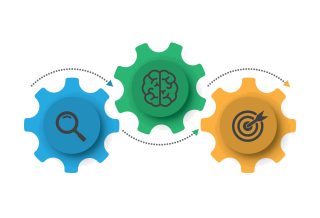FOCUS
To master the steps, revisit the basics
By Suzanne Bouffard
Categories: FundamentalsApril 2020
Vol 41, No. 2
Whenever I learn something new — dancing, cooking, statistics — the beginning of the learning curve tends to be quite rewarding. It’s the next stage I find most frustrating, the stage I think of as going beyond the basics.
In my early adulthood, I became enthralled with Lindy Hop. In this style of social dancing, the partners know a common vocabulary of steps but determine in the moment which ones to dance and when. Beginning Lindy Hoppers start with the aptly named basic step, gradually adding more complicated moves. Simultaneously, you learn the physical cues of how to lead and follow. With those foundational skills, you’re ready to go out dancing.
It’s just after you gain confidence that things fall apart. It happens when you start to branch out into improvisation, the real heart of Lindy. You break away from your partner for a minute, add a little flourish, throw in an improvised turn. And at that point, everything you’ve mastered so far, even the basic step, becomes mangled. Beginning Lindy Hoppers are tentative but conscientious; advanced beginning Lindy Hoppers are, generally speaking, a mess.
But in Lindy and in life, you have to go through that awkward phase to get really good. You have to stretch yourself and take some risks. To deal with the messiness this creates, sometimes you have to go back and review the basics. And sometimes you just have to plow through the awkwardness, missing a few downbeats and bumping into your partner, until it becomes natural.
As educators know, this awkward phase isn’t a one-time experience. If we are always learning new things — as learning professionals should be — we constantly go through cycles of newness, transition, and mastery.
This issue of The Learning Professional is dedicated to that important, frustrating, and ultimately rewarding process of going beyond the basics. It encourages all of us to question our assumptions, check in on the fundamentals, sharpen current practices, and move to the next level.
Like learning to improvise on the dance floor, some of the ideas might catch you off guard, like Thomas Guskey’s article (see Guskey article) about how practices change beliefs rather than the reverse. Others, like Amy Burton’s article (see Burton article)on implementing formative assessment might offer insight into a move you’ve always wanted to try but never learned. Some, like the article about transfer of learning by Maria Guilott and colleagues (see article)remind us that the most essential parts of our craft sometimes get lost unintentionally.
This issue’s Ideas section continues the learning about getting to the next level by homing in on leadership. The articles ask us to respond to the changing role of principals (see article ) realign goals and resources for effectiveness (see article)and support leaders with coaching that mirrors and models the support they should offer to teachers (see article).
Whatever you’re working on right now, whether you are learning the basic steps, adding new material to your polished repertoire, or muddling through your first improvisation, save a spot for Learning Forward on your dance card. We’re honored to be your partner.

Suzanne Bouffard is senior vice president of communications and publications at Learning Forward. She is the editor of The Learning Professional, Learning Forward’s flagship publication. She also contributes to the Learning Forward blog and webinars. With a background in child development, she has a passion for making research and best practices accessible to educators, policymakers, and families. She has written for many national publications including The New York Times and the Atlantic, and previously worked as a writer and researcher at the Harvard Graduate School of Education. She has a Ph.D. in developmental psychology from Duke University and a B.A. from Wesleyan University. She loves working with authors to help them develop their ideas and voices for publication.
Categories: Fundamentals
Recent Issues
LEARNING TO PIVOT
August 2024
Sometimes new information and situations call for major change. This issue...
GLOBAL PERSPECTIVES
June 2024
What does professional learning look like around the world? This issue...
WHERE TECHNOLOGY CAN TAKE US
April 2024
Technology is both a topic and a tool for professional learning. This...
EVALUATING PROFESSIONAL LEARNING
February 2024
How do you know your professional learning is working? This issue digs...










